Organizational Behavior Report - BTEC Unit 12 Analysis
VerifiedAdded on 2023/01/11
|11
|792
|27
Report
AI Summary
This report provides an overview of organizational behavior, focusing on cooperation, team dynamics, and leadership within an organizational context. It explores different types of teams, including functional, problem-solving, project, and virtual teams. The report discusses Tuckman’s Team Development Model and the Path-Goal Theory of Leadership, highlighting directive, supportive, participative, and achievement-oriented leadership styles. It also examines contemporary barriers to effective behavior, such as dominating team members and poorly managed conflicts, along with the Social Capital and Contingency Theories. The conclusion emphasizes the importance of cooperation and the suitability of the Path-Goal Theory for task completion. References to relevant academic sources are also included.
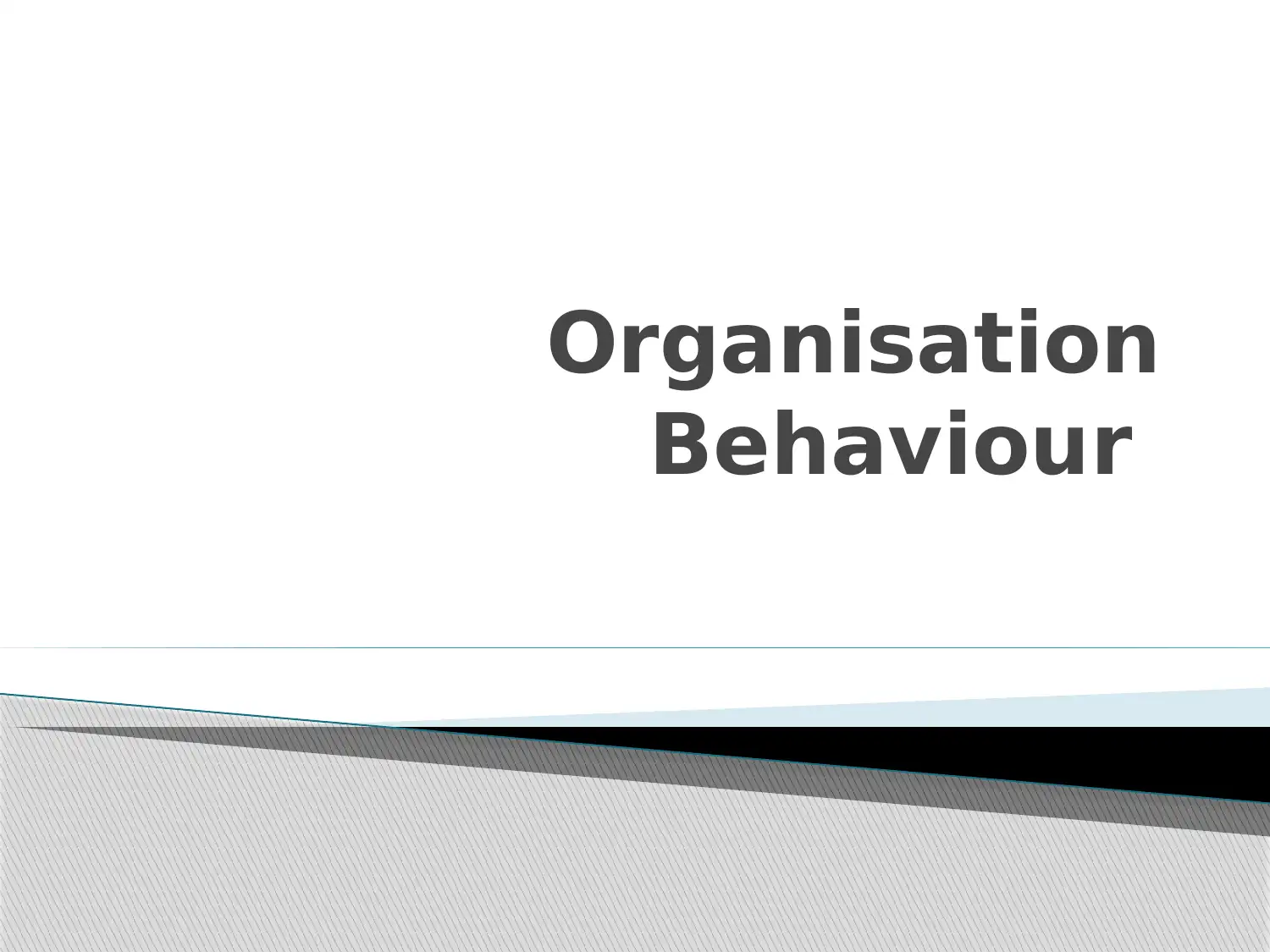
Organisation
Behaviour
Behaviour
Paraphrase This Document
Need a fresh take? Get an instant paraphrase of this document with our AI Paraphraser
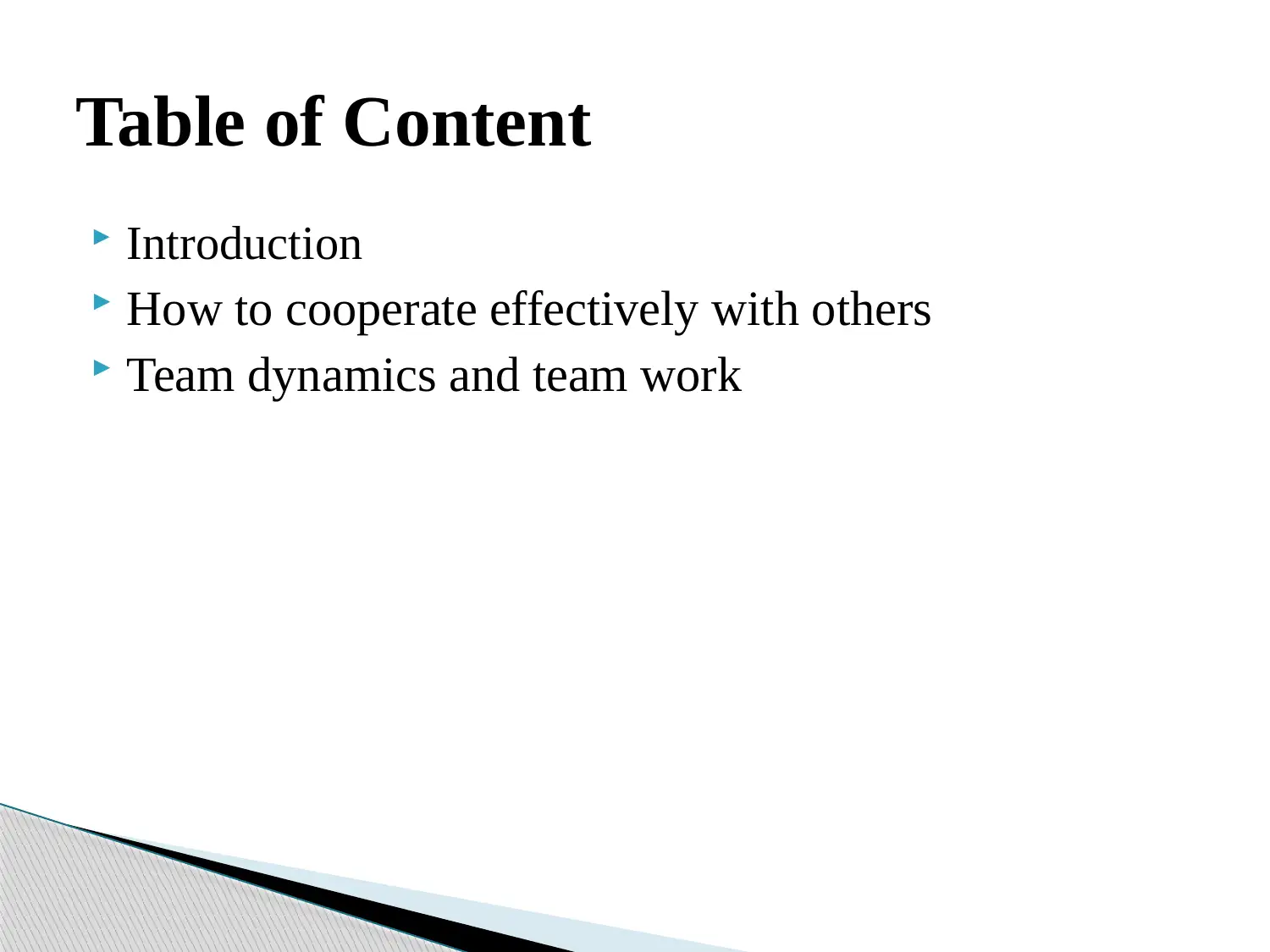
Introduction
How to cooperate effectively with others
Team dynamics and team work
Table of Content
How to cooperate effectively with others
Team dynamics and team work
Table of Content
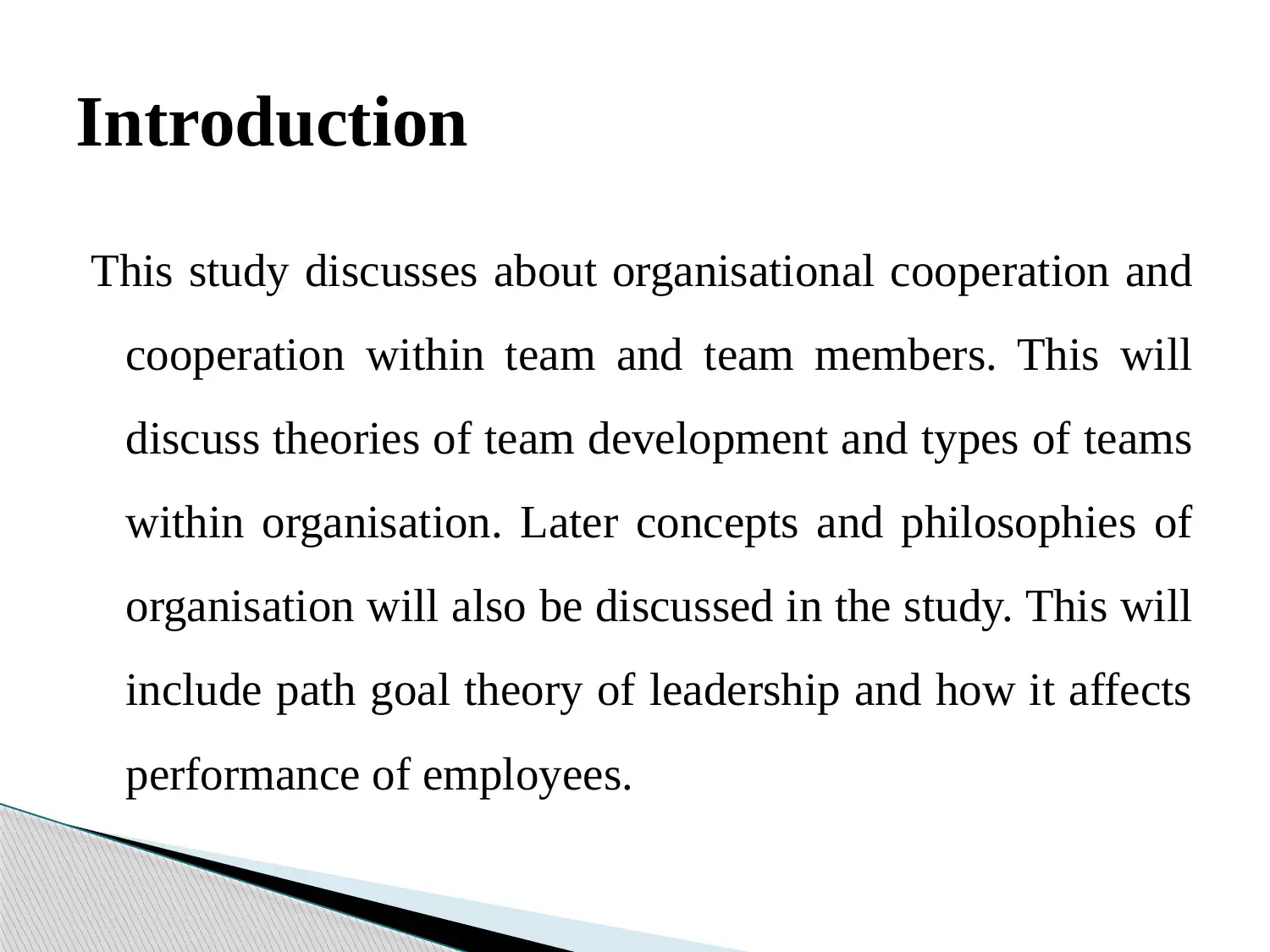
This study discusses about organisational cooperation and
cooperation within team and team members. This will
discuss theories of team development and types of teams
within organisation. Later concepts and philosophies of
organisation will also be discussed in the study. This will
include path goal theory of leadership and how it affects
performance of employees.
Introduction
cooperation within team and team members. This will
discuss theories of team development and types of teams
within organisation. Later concepts and philosophies of
organisation will also be discussed in the study. This will
include path goal theory of leadership and how it affects
performance of employees.
Introduction
⊘ This is a preview!⊘
Do you want full access?
Subscribe today to unlock all pages.

Trusted by 1+ million students worldwide
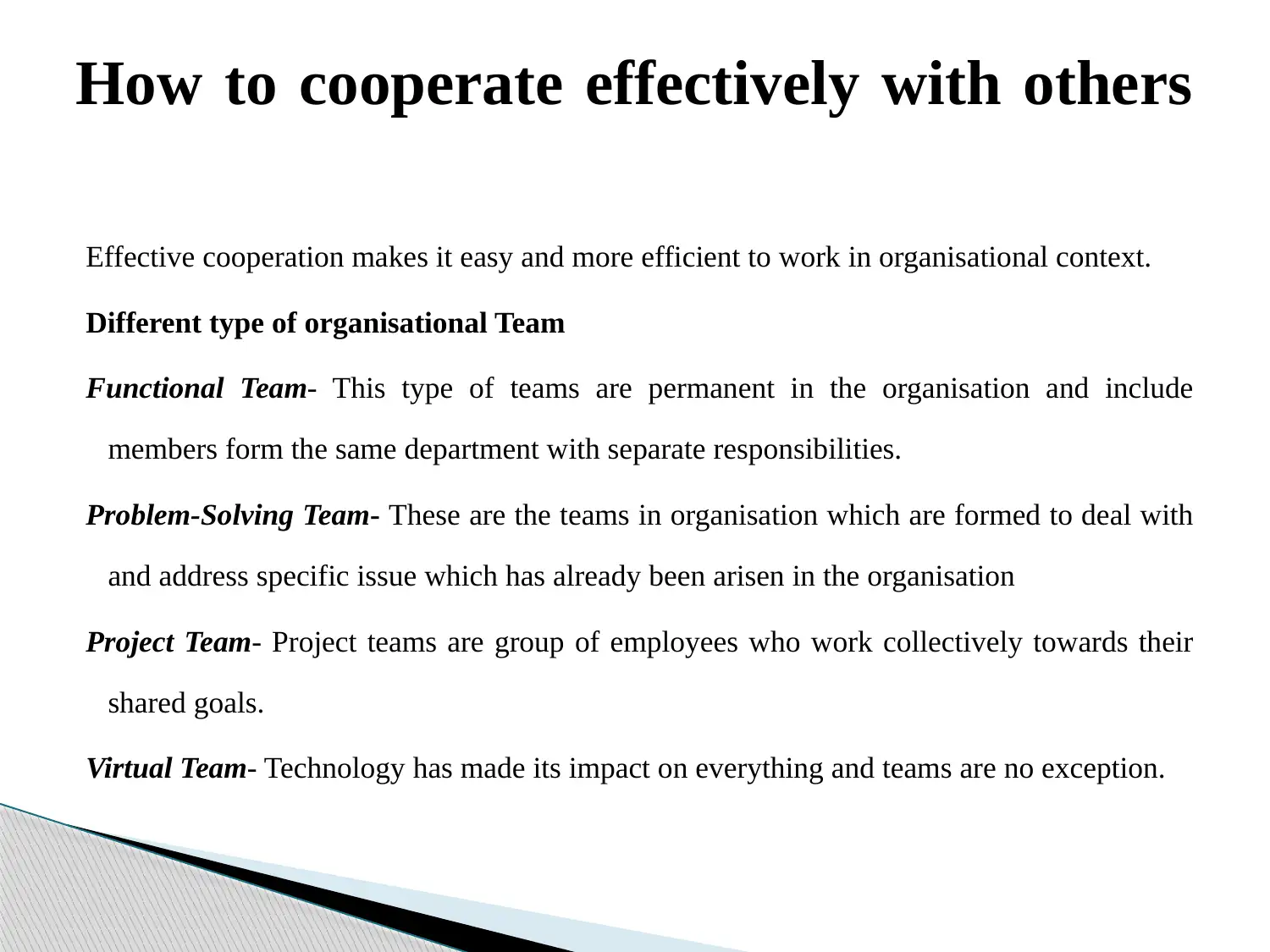
Effective cooperation makes it easy and more efficient to work in organisational context.
Different type of organisational Team
Functional Team- This type of teams are permanent in the organisation and include
members form the same department with separate responsibilities.
Problem-Solving Team- These are the teams in organisation which are formed to deal with
and address specific issue which has already been arisen in the organisation
Project Team- Project teams are group of employees who work collectively towards their
shared goals.
Virtual Team- Technology has made its impact on everything and teams are no exception.
How to cooperate effectively with others
Different type of organisational Team
Functional Team- This type of teams are permanent in the organisation and include
members form the same department with separate responsibilities.
Problem-Solving Team- These are the teams in organisation which are formed to deal with
and address specific issue which has already been arisen in the organisation
Project Team- Project teams are group of employees who work collectively towards their
shared goals.
Virtual Team- Technology has made its impact on everything and teams are no exception.
How to cooperate effectively with others
Paraphrase This Document
Need a fresh take? Get an instant paraphrase of this document with our AI Paraphraser
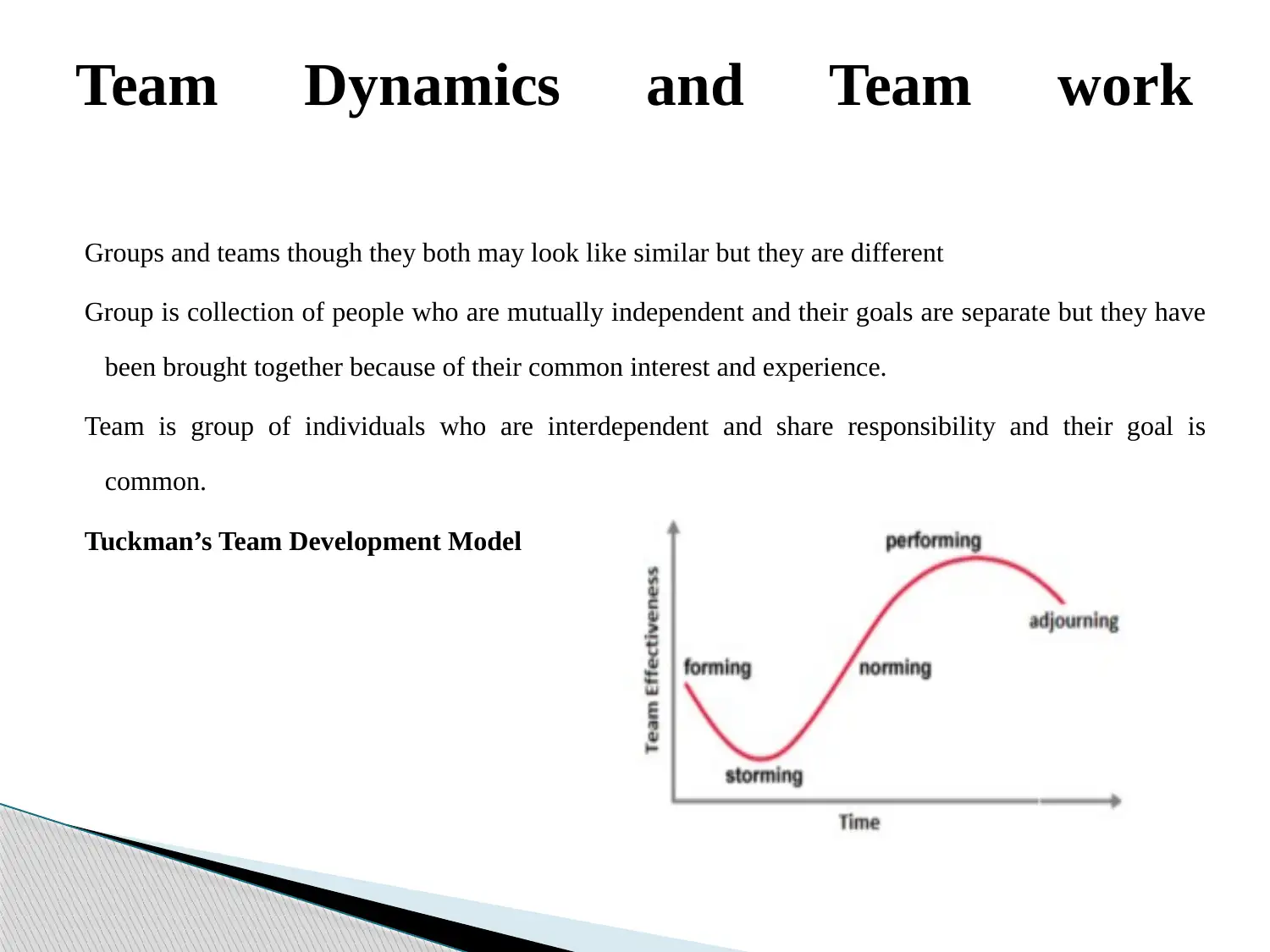
Groups and teams though they both may look like similar but they are different
Group is collection of people who are mutually independent and their goals are separate but they have
been brought together because of their common interest and experience.
Team is group of individuals who are interdependent and share responsibility and their goal is
common.
Tuckman’s Team Development Model
Team Dynamics and Team work
Group is collection of people who are mutually independent and their goals are separate but they have
been brought together because of their common interest and experience.
Team is group of individuals who are interdependent and share responsibility and their goal is
common.
Tuckman’s Team Development Model
Team Dynamics and Team work
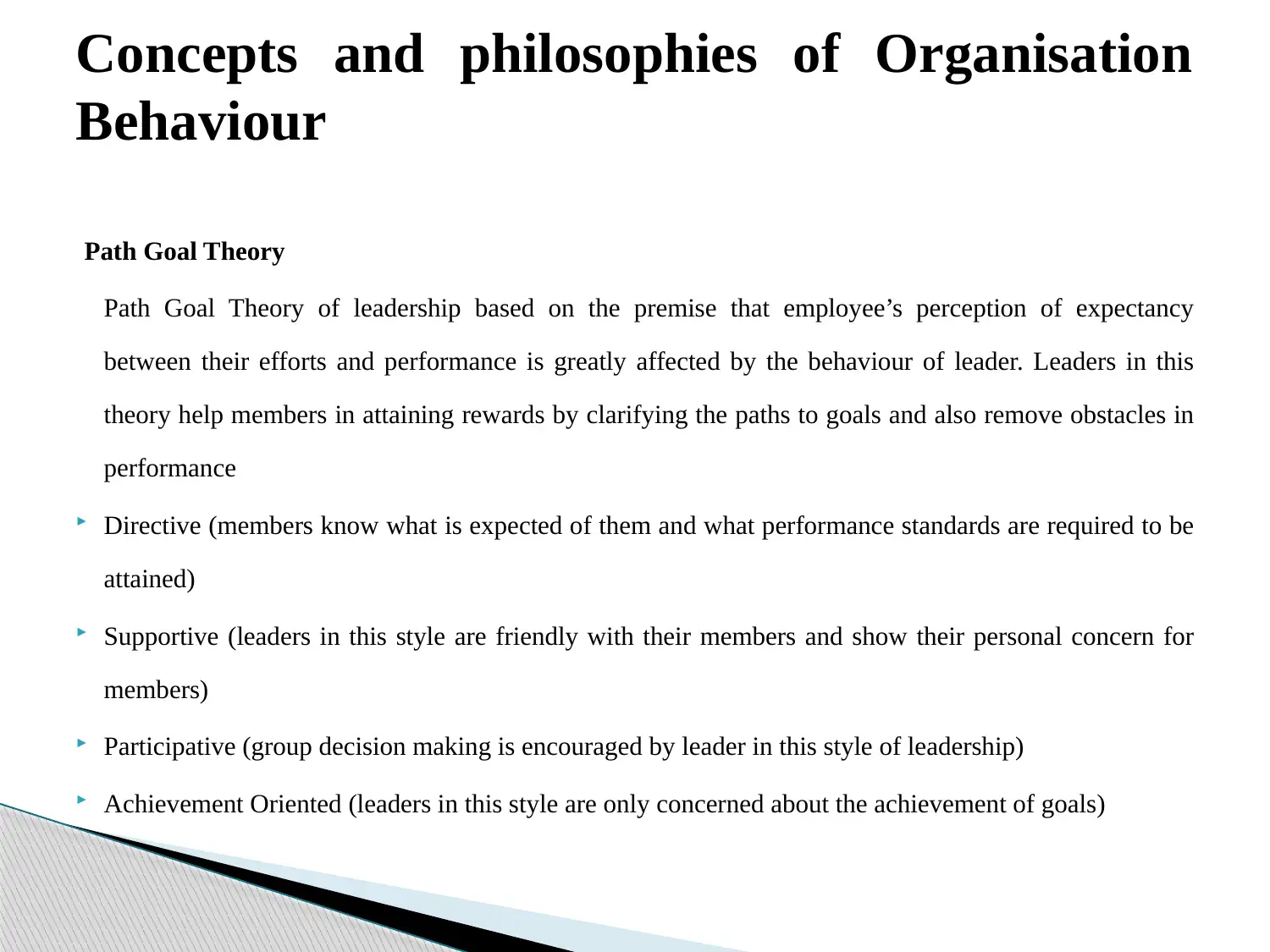
Path Goal Theory
Path Goal Theory of leadership based on the premise that employee’s perception of expectancy
between their efforts and performance is greatly affected by the behaviour of leader. Leaders in this
theory help members in attaining rewards by clarifying the paths to goals and also remove obstacles in
performance
Directive (members know what is expected of them and what performance standards are required to be
attained)
Supportive (leaders in this style are friendly with their members and show their personal concern for
members)
Participative (group decision making is encouraged by leader in this style of leadership)
Achievement Oriented (leaders in this style are only concerned about the achievement of goals)
Concepts and philosophies of Organisation
Behaviour
Path Goal Theory of leadership based on the premise that employee’s perception of expectancy
between their efforts and performance is greatly affected by the behaviour of leader. Leaders in this
theory help members in attaining rewards by clarifying the paths to goals and also remove obstacles in
performance
Directive (members know what is expected of them and what performance standards are required to be
attained)
Supportive (leaders in this style are friendly with their members and show their personal concern for
members)
Participative (group decision making is encouraged by leader in this style of leadership)
Achievement Oriented (leaders in this style are only concerned about the achievement of goals)
Concepts and philosophies of Organisation
Behaviour
⊘ This is a preview!⊘
Do you want full access?
Subscribe today to unlock all pages.

Trusted by 1+ million students worldwide
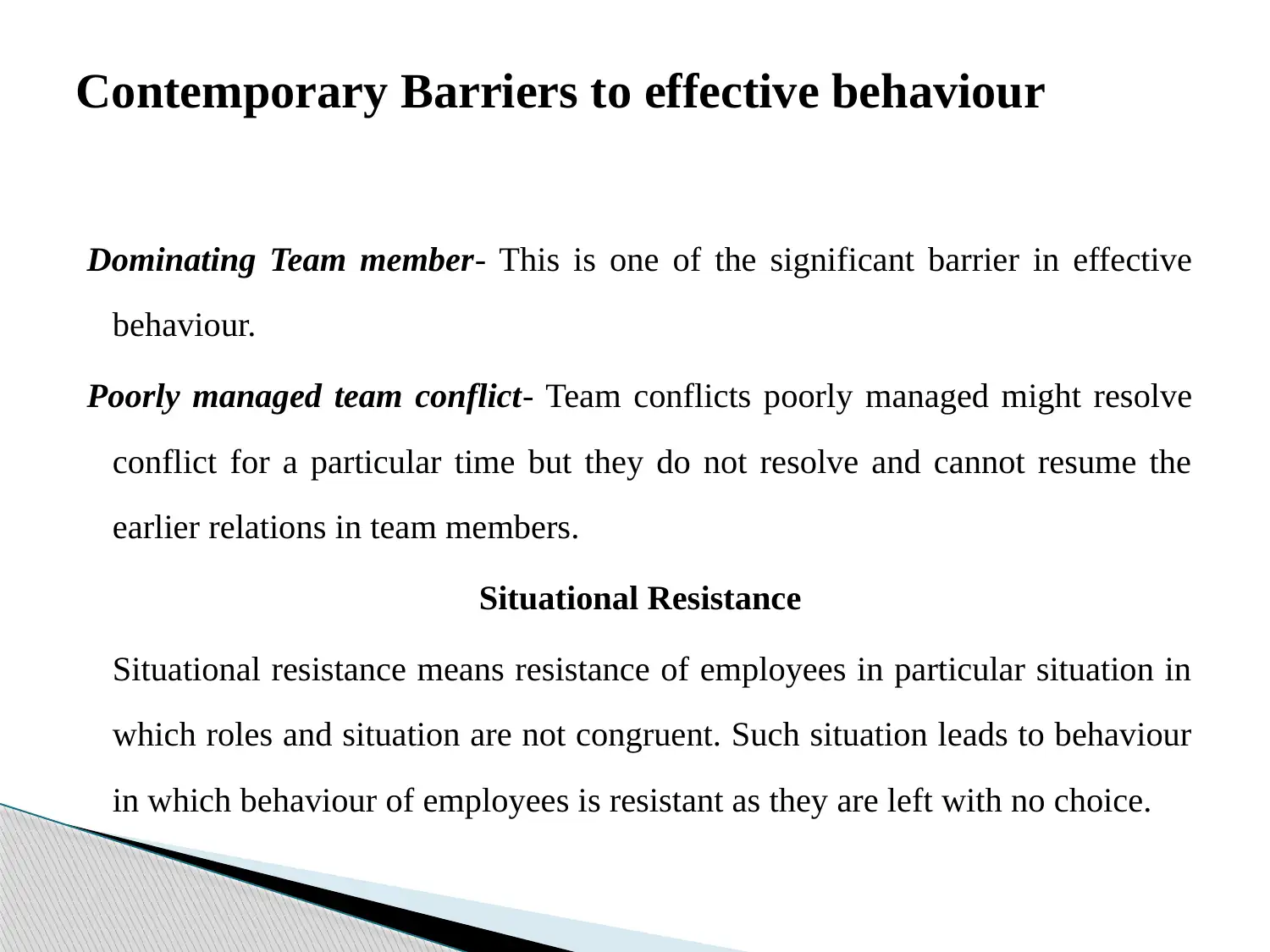
Dominating Team member- This is one of the significant barrier in effective
behaviour.
Poorly managed team conflict- Team conflicts poorly managed might resolve
conflict for a particular time but they do not resolve and cannot resume the
earlier relations in team members.
Situational Resistance
Situational resistance means resistance of employees in particular situation in
which roles and situation are not congruent. Such situation leads to behaviour
in which behaviour of employees is resistant as they are left with no choice.
Contemporary Barriers to effective behaviour
behaviour.
Poorly managed team conflict- Team conflicts poorly managed might resolve
conflict for a particular time but they do not resolve and cannot resume the
earlier relations in team members.
Situational Resistance
Situational resistance means resistance of employees in particular situation in
which roles and situation are not congruent. Such situation leads to behaviour
in which behaviour of employees is resistant as they are left with no choice.
Contemporary Barriers to effective behaviour
Paraphrase This Document
Need a fresh take? Get an instant paraphrase of this document with our AI Paraphraser
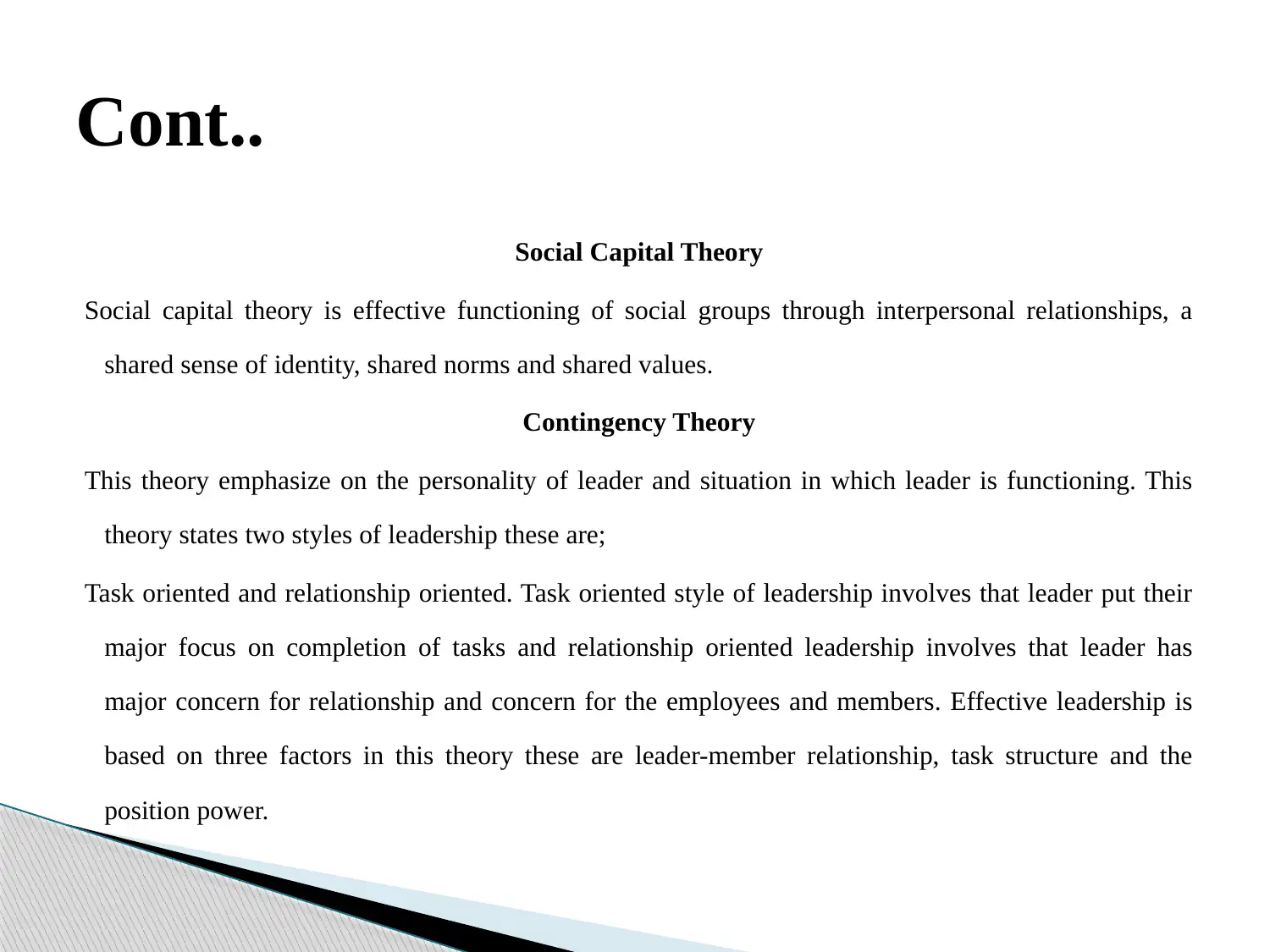
Social Capital Theory
Social capital theory is effective functioning of social groups through interpersonal relationships, a
shared sense of identity, shared norms and shared values.
Contingency Theory
This theory emphasize on the personality of leader and situation in which leader is functioning. This
theory states two styles of leadership these are;
Task oriented and relationship oriented. Task oriented style of leadership involves that leader put their
major focus on completion of tasks and relationship oriented leadership involves that leader has
major concern for relationship and concern for the employees and members. Effective leadership is
based on three factors in this theory these are leader-member relationship, task structure and the
position power.
Cont..
Social capital theory is effective functioning of social groups through interpersonal relationships, a
shared sense of identity, shared norms and shared values.
Contingency Theory
This theory emphasize on the personality of leader and situation in which leader is functioning. This
theory states two styles of leadership these are;
Task oriented and relationship oriented. Task oriented style of leadership involves that leader put their
major focus on completion of tasks and relationship oriented leadership involves that leader has
major concern for relationship and concern for the employees and members. Effective leadership is
based on three factors in this theory these are leader-member relationship, task structure and the
position power.
Cont..
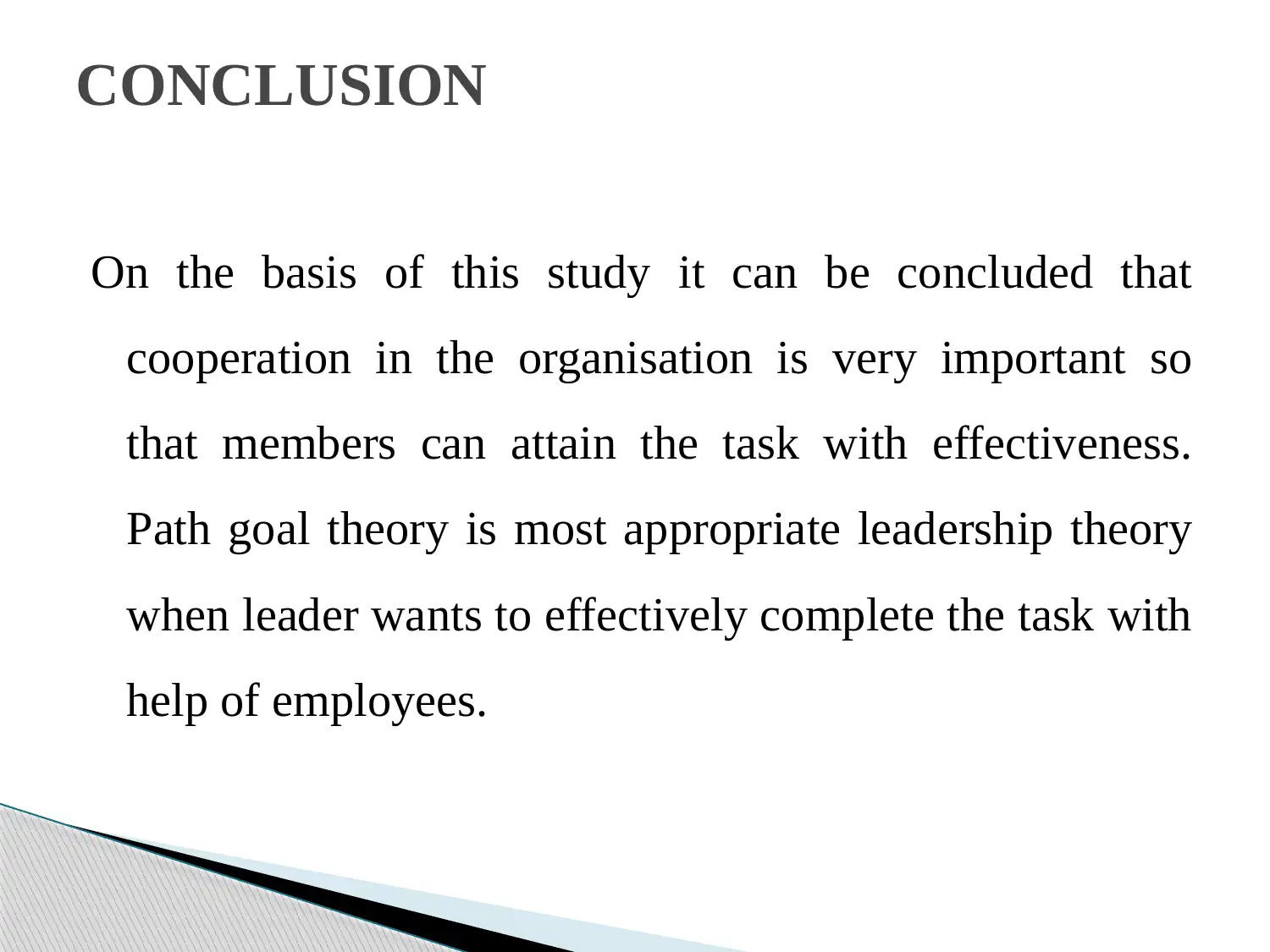
On the basis of this study it can be concluded that
cooperation in the organisation is very important so
that members can attain the task with effectiveness.
Path goal theory is most appropriate leadership theory
when leader wants to effectively complete the task with
help of employees.
CONCLUSION
cooperation in the organisation is very important so
that members can attain the task with effectiveness.
Path goal theory is most appropriate leadership theory
when leader wants to effectively complete the task with
help of employees.
CONCLUSION
⊘ This is a preview!⊘
Do you want full access?
Subscribe today to unlock all pages.

Trusted by 1+ million students worldwide
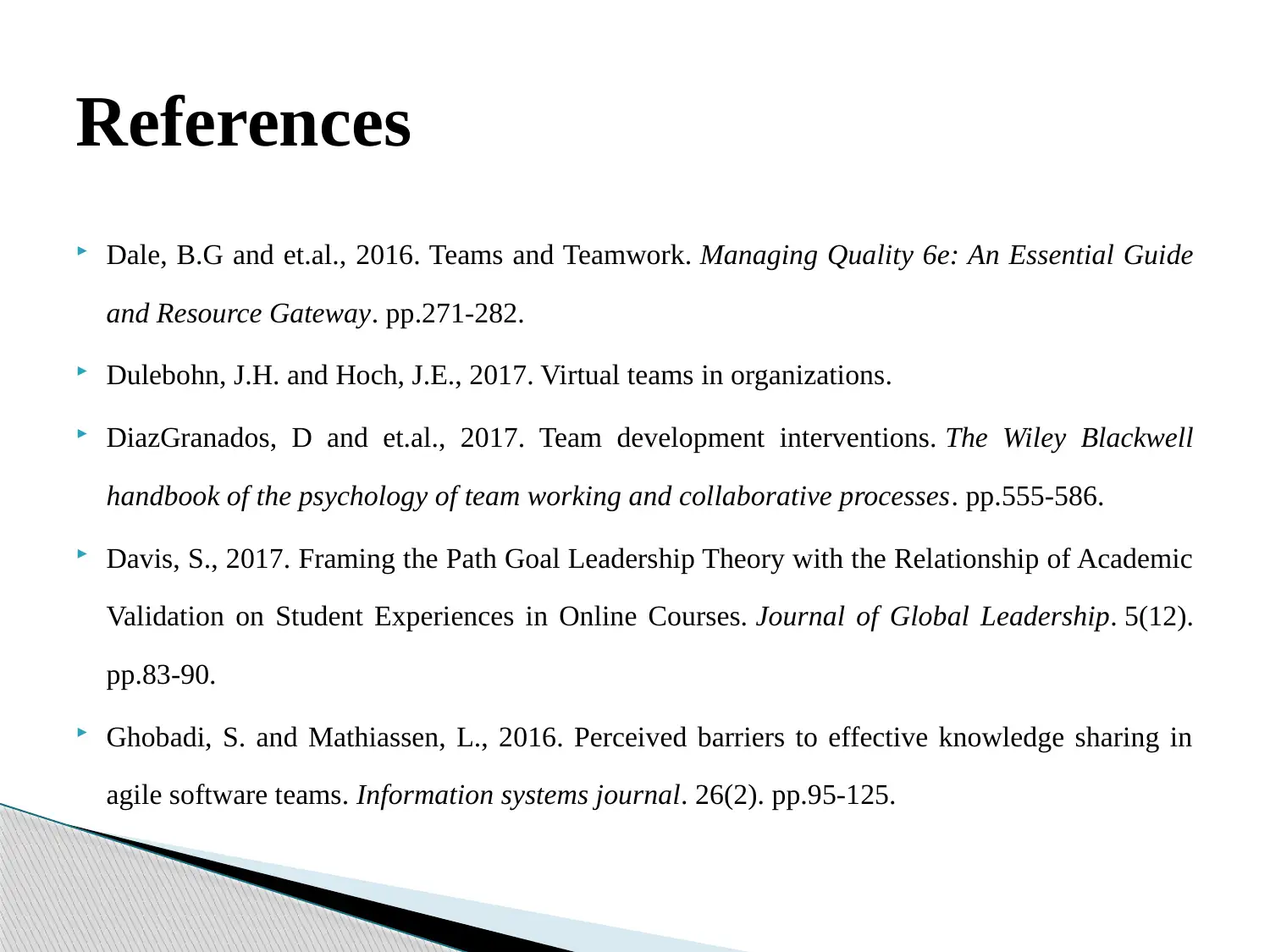
Dale, B.G and et.al., 2016. Teams and Teamwork. Managing Quality 6e: An Essential Guide
and Resource Gateway. pp.271-282.
Dulebohn, J.H. and Hoch, J.E., 2017. Virtual teams in organizations.
DiazGranados, D and et.al., 2017. Team development interventions. The Wiley Blackwell
handbook of the psychology of team working and collaborative processes. pp.555-586.
Davis, S., 2017. Framing the Path Goal Leadership Theory with the Relationship of Academic
Validation on Student Experiences in Online Courses. Journal of Global Leadership. 5(12).
pp.83-90.
Ghobadi, S. and Mathiassen, L., 2016. Perceived barriers to effective knowledge sharing in
agile software teams. Information systems journal. 26(2). pp.95-125.
References
and Resource Gateway. pp.271-282.
Dulebohn, J.H. and Hoch, J.E., 2017. Virtual teams in organizations.
DiazGranados, D and et.al., 2017. Team development interventions. The Wiley Blackwell
handbook of the psychology of team working and collaborative processes. pp.555-586.
Davis, S., 2017. Framing the Path Goal Leadership Theory with the Relationship of Academic
Validation on Student Experiences in Online Courses. Journal of Global Leadership. 5(12).
pp.83-90.
Ghobadi, S. and Mathiassen, L., 2016. Perceived barriers to effective knowledge sharing in
agile software teams. Information systems journal. 26(2). pp.95-125.
References
Paraphrase This Document
Need a fresh take? Get an instant paraphrase of this document with our AI Paraphraser

1 out of 11
Related Documents
Your All-in-One AI-Powered Toolkit for Academic Success.
+13062052269
info@desklib.com
Available 24*7 on WhatsApp / Email
![[object Object]](/_next/static/media/star-bottom.7253800d.svg)
Unlock your academic potential
Copyright © 2020–2026 A2Z Services. All Rights Reserved. Developed and managed by ZUCOL.




